#portraits not by van dyck
Explore tagged Tumblr posts
Text
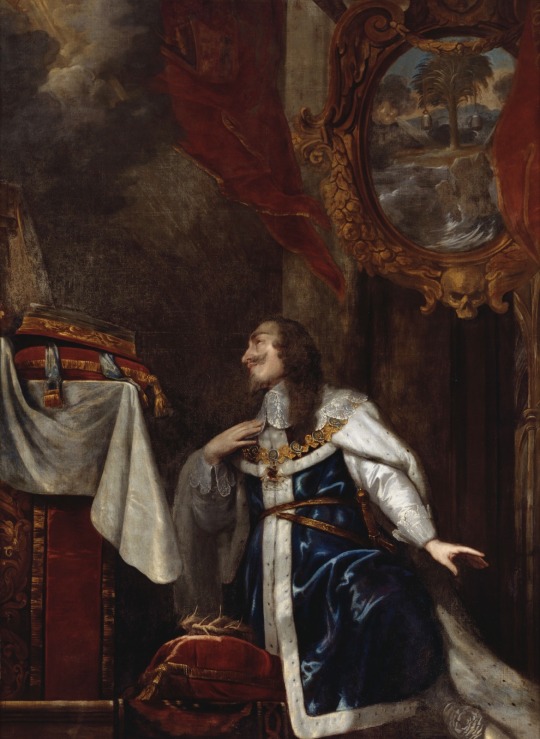
1/xx unknown posthumous painting of Charles I based on the frontispiece of the Eikon Basilike, after 1660, artist and current location unknown. Purchased by Sir J.C. Robinson at Foster's, 22 July 1891 (89); purchased for the Royal Collection by Queen Victoria in 1892
According to the Royal Collections Trust page on this monster….
Ten days after his execution of 30 January 1649 Charles I’s spiritual autobiography was published – the ‘Eikon Basilike’ or ‘Image of the King’. It is not certain whether this work was written by the King himself or ‘ghosted’ by John Gauden, Bishop of Worcester, but it was an extremely popular piece of Royalist justification and a central part of the development of the cult of King Charles the Martyr (who remains the only Saint canonised by the Church of England). Milton’s riposte, the ‘Eikonoklastes’ (‘The Iconoclast’ or ‘Image-Breaker’) of 1649, did not prevent this work of popular piety from going into many editions. The frontispiece of the ‘Eikon’, designed by William Marshall, and filled with allegorical devices, has always been as famous as the book itself. While not actually copying its composition at all, this painting is entirely derived from Marshall’s print. The King is shown dressed in full earthly splendour - coronation robes, Garter chain, lace collar and so on – but kneeling and praying fervently to an altar upon which is placed a Bible and above which the heavens open. The King has placed a crown of thorns on a cushion at his feet as if offering it (or perhaps taking it up). All the same things happen in the ‘Eikon’ frontispiece except that the King here explicitly takes a crown of thorns labeled ‘Grace’ in exchange for an earthly crown, labeled ‘Vanity’. Many of the allegories which in the ‘Eikon’ fill a landscape outside the chapel in which the King kneels have, in this case, been crowded into a painting-within-a-painting in a fine Baroque frame including a skull. A rock resists some waves and some winds (puffing faces); the same thing is the ‘Eikon’ is labeled ‘Immota, Triumphans’ (‘Unmoved Triumphant’). A palm tree is hung with weights because this tree was said to grow straighter the more weight it bears; in the ‘Eikon’ the same image bears the rubric ‘Crescit sub pondere Virtus’ (‘Virtue grows under weights’, that is in adversity). Such a splendid and public image must have been commissioned after the Restoration, and probably quite soon after, while the matter was still current in people’s minds. A date from the 1660s would certainly fit with the painting’s style.
#charles i#baby charles#king charles i#yeah sure this is totally Protestant#portraits not by van dyck#y’know shit like this is why people think he was a crypto-catholic
4 notes
·
View notes
Text

Anthony van Dyck (1599-1641)
Portrait of the Sculptor François Duquesnoy (1597-1643), circa 1627-32
#Anthony van Dyck#painter#artwork#painting#17th century#history of art#portrait#François Duquesnoy#baroque
100 notes
·
View notes
Text
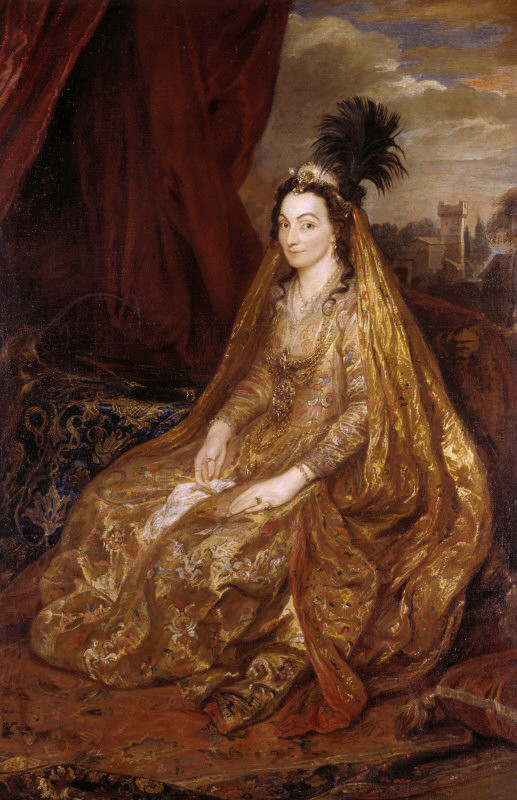
Teresa, or Teresia Sampsonia, Lady Shirley (1589–1668)
Artist: Sir Anthony Van Dyck (Flemish, 1599-1641)
Date: 1622
Medium: Oil on canvas
Collection: National Trust Collections, United Kingdom
Description
Teresa Sampsonia (born Sampsonia; after marriage Lady Shirley, 1589–1668) was an Iranian-English noblewoman of the Safavid Empire of Iran. She was the wife of Elizabethan English adventurer Robert Shirley, whom she accompanied on his travels and embassies across Europe in the name of the Safavid King (Shah) Abbas the Great.
Teresa was received by many of the royal houses of Europe, such as English prince Henry Frederick and Queen Anne (her child's godparents) and contemporary writers and artists such as Thomas Herbert and Anthony van Dyck. Herbert considered Robert Shirley "the greatest Traveller of his time", but admired the "undaunted Lady Teresa" even more. Following the death of her husband from dysentery in 1628, and due to impediments from grandees at the court, and the authorities, during the reign of Abbas's successor and grandson Safi (r. 1629–1642), Teresa decided to leave Iran. She lived in a convent in Rome for the rest of her life, devoting her time to charity and religion. As a pious Christian, and because of her love for her husband, Teresa had Shirley's remains transported to Rome from Isfahan and reburied; on the headstone of their mutual grave she mentions their travels and refers to her noble Circassian origins.
Thanks to her exploits, Teresa has been described as someone who subverted patriarchal gender roles common to the Muslim and Christian cultures of her time. Due to their hybrid identities and adventures, Teresa and her husband became the subject of several contemporary literary and visual works. Nevertheless, the story of Teresa as an important woman of the 17th century has been largely overshadowed and obscured by the tale of her husband Robert and his brothers.
Together they made two extended voyages across Europe. In 1611 they travelled to England where Teresa gave birth to their son, Henry. In 1613 they returned to Isfahan on an East India Company ship. The Shirleys continued to travel over the next decade to India, Portugal, Spain and Italy. They went to Rome in 1622, and this picture and the pendant portrait of Robert can be dated to Van Dyck's first visit to the city.
Van Dyck’s training with Rubens had sharpened his eye for the enriching effect offered by sumptuous garments such as those worn by Lady Shirley. Van Dyck had also recently begun to absorb the lessons of Titian and the other great Venetian colourists.
Teresa was a gifted linguist and spoke more than half a dozen languages. Historian Bernadette Andrea recounts how she saved her husband’s life on at least two occasions: ‘once as they set off on their first journey when his Persian enemies sought to kill him, which earned her the accolade "a true Amazon" and again when the couple encountered hostile Portuguese traders on their way to Goa.’ (See the entry for 'Lady Teresa Sampsonia Sherley' in the Oxford Dictionary of National Biography).
After Robert’s death, Teresa was accused of the capital crime of apostasy and her property was confiscated. She became a fugitive, hiding in an Augustinian church in Isfahan and an Armenian convent just outside the Safavid capital. She received a special permit to travel, went to Istanbul for three years and then on to Rome where she settled and remained for more than three decades until her death in 1668.
#portrait#teresa sampsonia#safavid empire of iran#golden dress#persian rug#seated#veil#jewels#iranian noblewoman#oil on canvas#artwork#fine art#oil painting#iranian history#anthony van dyck#flemish painter#national trust collections#flemish art#17th century painting#european art
25 notes
·
View notes
Text

William II, Prince of Orange, and his Bride, Mary Stuart (1641), (detail), by Sir Anthony van Dyck (Flemish, 1599–1641), oil on canvas, 182.5 × 142 cm, The Rijksmuseum, Amsterdam
#william ii prince of orange and his bride mary stuart#anthony van dyck#painting#painting detail#detail#my upload#oil on canvas#rijksmuseum#amsterdam#portrait#royal portrait#17th century#baroque#william ii prince of orange#mary princess royal and princess of orange#mary henrietta princess royal#mary henrietta#art#fine art
68 notes
·
View notes
Text
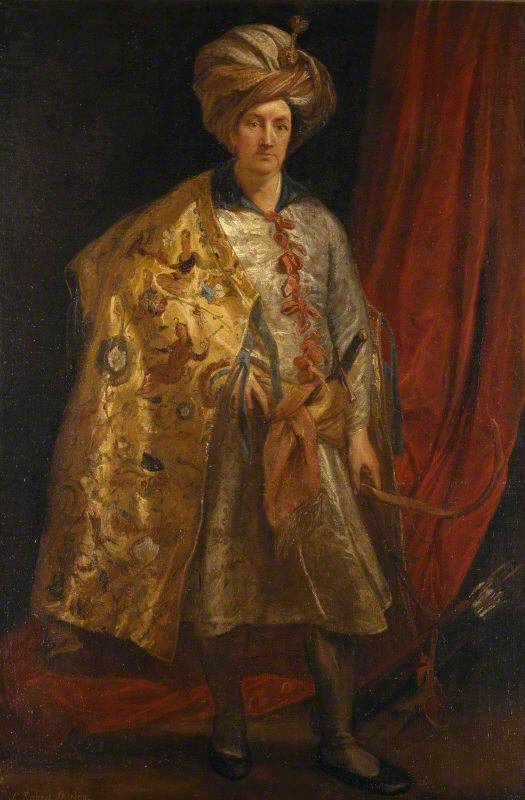
Sir Robert Shirley (1581-1628)
Artist: Sir Anthony Van Dyck (Flemish, 1599-London)
Date: 1622
Medium: Oil on canvas
Collection: National Trust Collections, United Kingdom
Description
This fascinating portrait, dressed in Persian clothes, was painted in Rome in 1622. Robert Shirley was an adventurer, who from 1608 served as ambassador to the Persian shah Abbas the Great (1571–1629) and adopted Persian customs. Teresia Shirley was Circassian (people from the north-east shore of the Black Sea in Russia) and is shown seated demurely against a view of Rome. The painter, Sir Anthony van Dyck (1599–1641), may have been attracted to painting these sitters partly as a result of the stunning visual effect of their lavish clothes.
#portrait#full length#oil on canvas#sir robert shirley#persian clothes#flemish art#view of rome#man#oriental costume#turban#english traveler and adventurer#fine art#oil painting#artwork#sir anthony van dyck#flemish painter#european art#17th century painting#national trust collections
21 notes
·
View notes
Text



















Historical Portraits of Children // The Truth is a Cave – The Oh Hellos
Four Children Making Music – attributed to the master of the Countess of Warwick, 1565 // Three Children with a Dog or Two Sisters and a Brother of the Artist – Sofonisba Anguissola, 1570-1590 // The Children of Philip III of Spain (Ferdinand, Alfonso, and Margarita) – Bartolomé González y Serrano, 1612 // Three Children with a Goat-Cart – Frans Hals, 1620 // The Balbi Children – Anthony van Dyck, 1625-1627 // The Three Eldest Children of Charles I – Anthony van Dyck, 1635-1636 // Five Eldest Children of Charles I – Anthony van Dyck, 1637 // Portrait of the Children of Habert de Montmor – Philippe de Champaigne, 1649 // Group Portrait of Charlotte Eleonora zu Dohna, Amalia Louisa zu Dohna, and Friedrich Christoph zu Dohna-Carwinden – Pieter Nason, 1667 // The Graham Children – William Hogarth, 1742 // Portrait of Sir Edward Walpole’s Children – Stephen Slaughter, 1747 // The Bateson Children – Strickland Lowry, 1762 // The Gower Family: The Five Youngest Children of the 2nd Earl Gower – George Romney, 1776-1777 // Marie-Antoinette de Lorraine-Habsbourg, Queen of France, and Her Children – Élisabeth Louise Vigée Le Brun, 1787 // The Marsham Children – Thomas Gainsborough, 1787 // The Oddie Children – William Beechey, 1789 // Three Siblings – Johann Nepomuk Mayer, 1846 // Happy Children – Paul Barthel, 1898 // My Children – Joaquín Sorolla, 1904 // The Truth is a Cave – The Oh Hellos
#this line makes me feel Very Normal and not at all Deranged 🥴😵💫#portraiture#family portrait#portrait#portrait painting#sofonisba anguissola#frans hals#anthony van dyck#philippe de champaigne#william hogarth#george romney#elisabeth vigee le brun#elisabeth louise vigee le brun#thomas gainsborough#joaquin sorolla#the truth is a cave#the truth is a cave song#the truth is a cave the oh hellos#through the deep dark valley#through the deep dark valley album#through the deep dark valley the oh hellos#the oh hellos#art history#art#lyrics#lyric art#long post
101 notes
·
View notes
Text
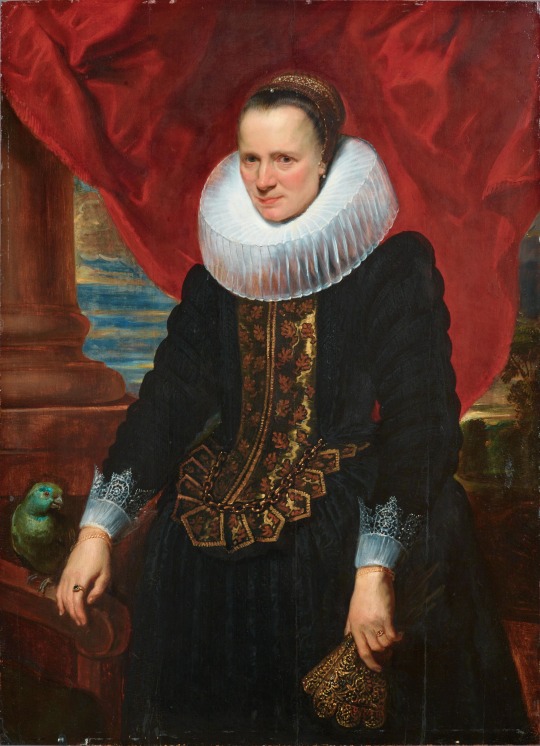
Portrait Of A Noblewoman With A Parrot
Anthony van Dyck
68 notes
·
View notes
Photo

Antoon van Dyck - Self-Portrait - 1615
33 notes
·
View notes
Text

Genoese Noblewoman, Anthony van Dyck, circa 1625-27
Oil on canvas 90 ⅞ x 61 ⅝ in. (230.8 x 156.5 cm) The Frick Collection, New York City, NY, USA
#art#painting#anthony van dyck#baroque#1620s#17th century#17th century art#oil#portrait#the frick#flemish#dutch
91 notes
·
View notes
Text
Sir Anthony Van Dyck, portrait of English musician and composer Nicholas Lanier, 1628

38 notes
·
View notes
Text

lewis hamilton as van dyck's self-portrait with a sunflower 🌻
part of my ongoing series of formula 1 drivers as popular paintings! 🏎️🖤
#ween art#art#painting#portrait#artists on tumblr#traditional art#traditional painting#gouache#gouache painting#f1#formula 1#lewis hamilton#lh44#team lh44#f1 fanart#formula 1 fanart#formula one#f1blr#f1 art#anthony van dyck#van dyck#self-portrait with a sunflower
32 notes
·
View notes
Text

Adrian Hannemann, Lucy Percy, Countess of Carlisle, c1640, location unknown
#lucy countess of carlisle#charles i#george villiers#duke of buckingham#henrietta maria#steenie#portraits not by van dyck
2 notes
·
View notes
Text


Anthony van Dyck (Flemish, 1599-1641) • SSelf-Portrait with Sunflower • c. 1620–21
#art#art history#painting#self portrait#oil painting#anthony van dyck#flemish painter#baroque art#the canvas mirror art blog#artist as subject#art blogs on tumblr#art lovers on tumblr#17th century art
25 notes
·
View notes
Text

Anthony van Dyck, Rachel Wriothesley, Countess of Southampton as Fortune (1630), detail
#Anthony van Dyck#art#paint#1600s#classical paint#classic paint#classical art#classic art#blue#woman#painting#detail#close up#close up paint#portrait
14 notes
·
View notes
Photo
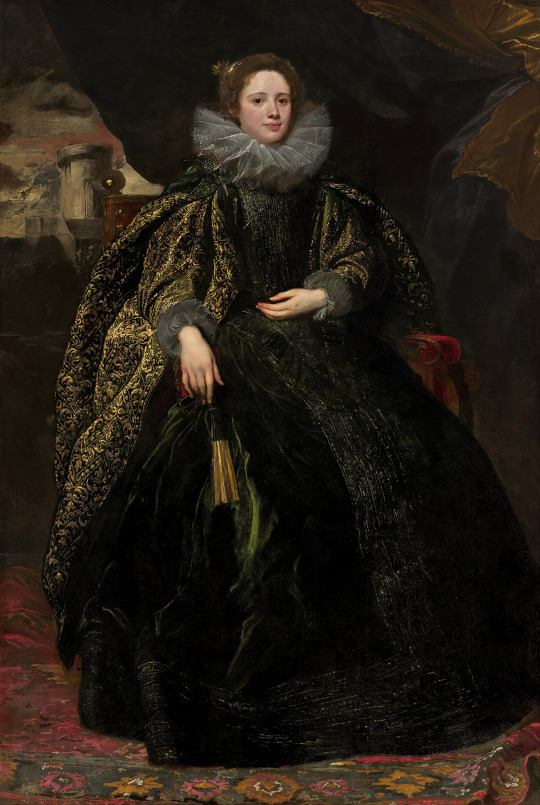
Anthony van Dyck (Flemish, 1599-1641) Marchesa Balbi, c.1623 National Gallery of Art
#Anthony van Dyck#flemish art#flemish#Marchesa Balbi#classical art#female portrait#european art#europe#art#european#female#portrait#lace collar#1600s#1600s fashion
250 notes
·
View notes
Text

Anne (Killigrew) Kirke
Artist: Anthony van Dyck (Flemish, 1599-1641)
Date: c. 1637
Medium: Oil on canvas
Collection: The Huntington Library, Art Museum, and Botanical Gardens, San Marino, CA, United States
Anne Killigrew
Anne Killigrew, the eldest of seven daughters among twelve children of Sir Robert (1579-1633) and Lady Mary (Woodhouse) Killigrew, was baptized on September 7, 1607 at Hanworth, Middlesex. Her father took interest in his daughters' educations, and raised them in a stimulating intellectual environment, with the poets John Donne (1572-1631) and Constantijn Huygens (1596-1687), the musician and painter Nicholas Lanier (1588-1666), and the philosopher and statesman Sir Francis Bacon (1561-1626) figuring among the family's intimates. She descended from a long line of royalists and courtiers, and it was reportedly Charles I (1600-49) who orchestrated her match with George Kirke, a Groom to the Royal Bedchamber whose service to Charles pre-dated his accession to the throne in 1625.
Portrait Description
This portrait was almost certainly painted to commemorate Anne Kirke's appointment in 1637 as Dresser to Queen Henrietta Maria. She is depicted wearing a golden silk dress, decorated with a swath of brown gauze across the torso, and iridiscent pearls that reflect the burnished highlights of the silk. With a pointed finger, Anne directs our attention to a leaping dog, a butterfly, and a flowering rosebush. These symbols of fidelity, willingness to serve, and pain endured for pleasure, may refer to her happy marriage and achievements at court.
#portrait#female#oil on canvas#english culture#anne killigrew#full length#golden silk dress#brown gauze#iridiscent pearls#dog#butterly#rosebush#dresser to queen henrietta maria#red curtain#flemish art#artwork#oil painting#fine art#flemish painter#anthony van dyck#17th century painting#european art
11 notes
·
View notes